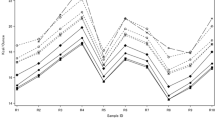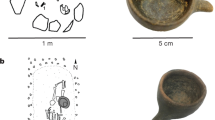Abstract
WE have administered labelled (radioactive) sodium phosphate to goats and investigated to what extent phosphorus present in different compounds extracted from the blood and the milk became labelled. In two cases the goat was killed after the experiment and the phosphorus compounds present in the organs investigated as well. Some of the results obtained are seen in the accompanying table.
This is a preview of subscription content, access via your institution
Access options
Subscribe to this journal
Receive 51 print issues and online access
$199.00 per year
only $3.90 per issue
Buy this article
- Purchase on Springer Link
- Instant access to full article PDF
Prices may be subject to local taxes which are calculated during checkout
Similar content being viewed by others
References
Cf. Hahn, L., and Hevesy, G., NATURE, 140, 1059 (1937).
Cf. Robison, R. "The Significance of Phosphoric Esters in Metabolism" (New York, 1932), 66.
A detailed account of the experimental results obtained will be found in the dissertation of A. H. W. Aten, jun., to be presented to the University of Utrecht.
Author information
Authors and Affiliations
Rights and permissions
About this article
Cite this article
ATEN, A., HEVESY, G. Formation of Milk. Nature 142, 111–112 (1938). https://doi.org/10.1038/142111a0
Issue Date:
DOI: https://doi.org/10.1038/142111a0
This article is cited by
Comments
By submitting a comment you agree to abide by our Terms and Community Guidelines. If you find something abusive or that does not comply with our terms or guidelines please flag it as inappropriate.



